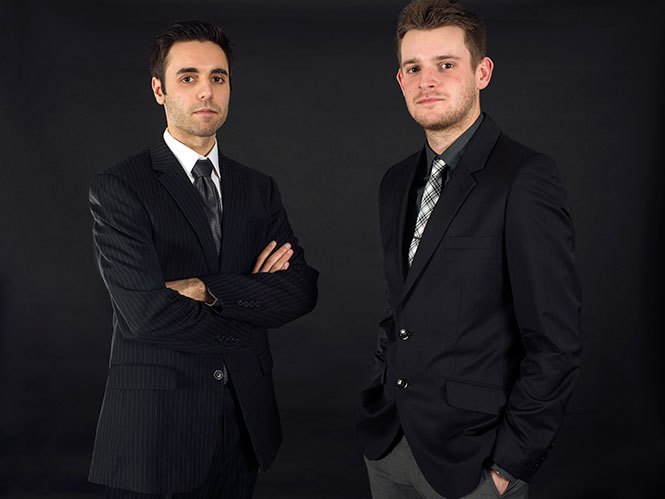Chiming in on a shrouded subject
January 22, 2014
If you’re a hearing person, imagine a world of complete silence. You can see people talking, dogs barking and rain pounding on your windowsill … but you can’t hear any of it. Some deaf people are OK living out their lives like this, but others yearn to hear the world and experience every noise their environment has to offer.
With the help of cochlear implants, hearing could be a reality for someone who was born deaf or became deaf during his or her lifetime.
Director Justin Loncar teamed up with producer Caroline Abbey, a recent graduate, and two Kent State seniors to shed light on a topic that usually gets overlooked.
“Out of the Silence: The Documentary,” directed by Loncar, will delve into the controversy surrounding cochlear implants and their role in the deaf community.
“My desire is to create an inspiring documentary on the screen for the world to understand the truth about cochlear implants,” he said. “We will be sharing stories of successful people who, with the help of cochlear implants, have gone on to excel in all areas of their lives.”
Want to learn ASL?
Student Accessibility Services this spring will offer noncredit American Sign Language classes for beginners and more-advanced students beginning Feb. 3.
The six-week courses, ASL I and ASL II, are taught by hearing and deaf instructors, according to a flier distributed by SAS. Interpreting will be provided as needed.
The SAS flier says the courses are designed to teach conversational strategies including sentence structures, fingerspelling, vocabulary and information about deaf life and culture.
The ASL courses are open to all Kent State community members and students, regardless of major and will be held in the conference rooms on the lower level of the DeWeese Health Center.
The courses will be held Mondays from 5:30 to 6:45 p.m. The cost for the six classes is $85 and can be paid on the SAS website.
— Carrie Blazina, managing editor
This documentary is especially important to 22-year-old Loncar, who got a cochlear implant when he was 5 years old.
Loncar will dedicate the film to Dr. Franklin M. Rizer, who was the first Ohio surgeon to perform a cochlear implant. He was killed in a plane crash on March 20, 2003.
While cochlear implants seem to be a great option, there is some controversy surrounding them.
“The issue of cochlear implantation is quite multifaceted,” said Dr. Julia Huyck, an assistant professor in the Speech Pathology and Audiology program. “In cases where people are born with hearing and then lose it after acquiring language, cochlear implants often have a positive effect, allowing these people to re-connect with the hearing world.”
This was the case for Loncar, said Buddy Candela, co-host and senior electronic media production major. He said Loncar lost his hearing at the age of two.
“In cases where children are born without hearing, it is a complex issue that depends on the linguistic and sociocultural environment in which the child will be raised … and the risks and benefits for the specific child,” Huyck said.
The cast and crew of this documentary are aware of this controversy and don’t plan on hiding it in the film.
“They’ve sort of gotten a bad rep in the deaf community. People think ‘Well, we were born this way; [being deaf] isn’t something we should be trying to correct,’” said Jesse DiFranco, a senior communications major and other co-host of the documentary.
DiFranco, along with Candela, was born with the ability to hear. Both hosts were recruited by Loncar to work on the film.
“Our role is to talk to people and play mediator…we’ll sort of act as the audience member in the movie because we’re just finding out about it too. We’ll be talking to doctors and getting information because we’re finding out about it just as you’re finding out about it,” DiFranco said.
The documentary will follow a young lady who has decided to receive a cochlear implant recently as well as a star on “Project Runway” who has a cochlear implant.
The documentary will also play the role of devil’s advocate. Candela and DiFranco will be interviewing people who do not support cochlear implants and getting an inside view on why these implants cause such controversy.
“We want to help people understand more of how it works and how it changed our lives … I hate seeing my friends and the people who really want to be able to hear again [getting their feelings hurt and beliefs attacked by] the deaf community about it. They need to see something greater with positive stories about cochlear implants,” Loncar said.
While none of the production will be taking place on campus, the two hosts hope that members of Kent State can help support such a powerful movement.
“Right now, we don’t really have a budget. We’re launching a Kickstarter campaign, and that is how we will be accepting donations,” Candela said.
While the campaign has not started yet, anyone interested in the film or in donating can go on Facebook and like the page “Out of the Silence: The Documentary” for updates on the film and the Kickstarter campaign.
Any students interested in assisting with the tech team and production can also contact the staff through that Facebook page.
Loncar, Candela and DiFranco hope students and community members will use this documentary as a chance to learn more about a topic that often does not get discussed in daily conversation. For Loncar, it’s about educating people in general and inspiring those in the deaf community by sharing these incredible true stories.
Contact Erin Zaranec at [email protected].












